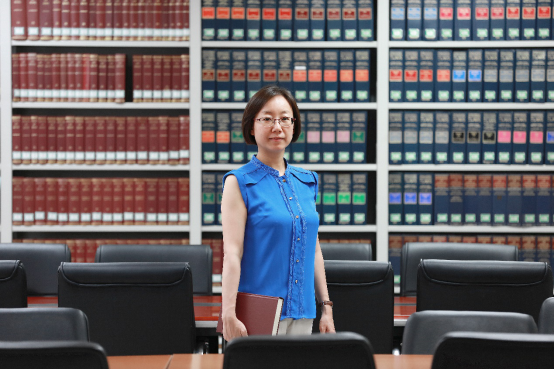
I. Basic Information
Dr. Dai Ruijun is an associate research fellow at the Institute of International Law, Chinese Academy of Social Sciences (CASS); and associate professorand a supervisor of graduate studentsat the CASS Graduate School.
She obtained her LL.B from Beijing Jiaotong University in 2003, and her LL.M and Ph.D. from CASS Graduate School in 2006 and 2009, respectively. She was a visiting scholar at the Law School of Columbia University, USA; a visiting professor at the Law School of Helsinki University, Finland; and a visiting scholar at the Law Faculty of Oxford University, UK. She joined the Centre for International Law Studies of CASS (predecessor of Institute of International Law of CASS) in 2006, and was transferred from the Research Department of Public International law to the Research Department of International Human Rights Law in 2009. Since 2015, she has been a supervisor of master’s students at CASS Graduate School,supervising graduate students in the field of public international law and international human rights law.
Dai Ruijun is a member of the Chinese Society of International Law and a member of the Research Society of Hong Kong Basic Law and Macau Basic Law. She serves as the Secretary-General of the Centre for Gender and Law Studies ofCASS Law Institute. She has been selected as one of the “100 Law Talents” by Beijing Society of Law, appointed as an expert on the development of women and children during the 13th Five-Year Plan Period of Beijing.
II. Main Research Fields and Academic Viewpoints
Her main research areas are public international law and international human rights law, with focus on such issues as the relationship between international law and municipal law, the law of treaties, the basic theory and monitoring mechanism of international human rights law, gender equality and women’s human rights, and the power of external affairs of Special Administrative Region. She has been the person in charge of the National Social Sciences Fund Project “Analysis of the status of international treaties in Chinese legal system and research on related institutional designs”, the CASS key project “Domestic application of international human rights treaties”, and the Basic Law project of Standing Committee of NPC “Power of External Affairs of the Special Administrative Region”. She has published one academic monograph, one co-authored monograph, and nearly 30 academic articles.
She has travelled worldwide, and presented her papers on several influential international academic conferences such as the World Conference on Constitutional Law and the Biennial Conference of the Asian Society of International Law. She has actively participated in several legislative consultations, and submitted advisory opinions and suggestions on the draft State Reports of China under UN human rights treaties.
Her work mainly focuses on the following topics.
Monitoring Mechanism of International Human Rights Law. She has published a series of articles, such as “Reform of the Monitoring Mechanism for UN Human Rights Treaties”(2009), “Sovereignty, Human Rights and China: from the Perspective of UN Human Rights Protection Mechanism and Its Reform”(2012), “Strengthening UN Human Rights Treaty Body System: Latest Development of UN Human Rights Protection System”(2013) and “Follow-up Procedure for UN Human Rights Monitoring Mechanisms”(2014), tracking the reform process and effectiveness of the United Nations’ Charter-based mechanism and treaty-based mechanism for human rights protection, and pointing out the contradiction between the motive of international human rights bodies to strengthen international human rights mechanism and their shortage of resources and backlog of work. She argued that the fundamental way out of the dilemma of international human rights mechanism is the improvement of domestic human rights protection system.
Relationship between International Law and Municipal Law. The paper “Taking International Law Seriously: An Empirical Investigation Based on Constitutional Texts of All Asian States” demonstrated a clear tendency among Asian constitutions: most countries choose to make definite commitment to their international obligations; and give primacy to international law, especially international human rights law, over national law. It provides positive reference for China to answer the question of the relationship between international law and domestic law in its constitution. The monograph Domestic Implementation of International Human Rights Treaties: a Global Perspective (Social Science Academic Press, 2013) proves the interaction between the acceptance of international human rights standards and domestic constitutional, legislative, judicial and administrative guarantees for human rights. “Impetus from International human rights Law for the Evolution of Fundamental Rights System” (2015) focuses on the evolvement offundamental constitutional rights system, and illustrates the obvious impact of international human rights law on the evolution process of constitutions.
Special Administrative Region’s Power of External Affairs. The core issue of the external affairs’ power of SAR is the conclusion and application of international treaties. The article “Conclusion and Application of International Treaties in Special Administrative Regions of China” comprehensively analyzes the theoretical and practical issues relating to the concluding procedures, responsibility, scope of application, approaches to application and the legal status of international treaties in SAR. In light of the misunderstandings of some country about the SAR’s external affairs, the article “Application of Bilateral Treaties Concluded by China in the Special Administrative Region: Comments on Sanum v. Laos Appeal Judgment” refutes the appeal judgment made by Singapore Supreme Court. Meanwhile, it points out that it is necessary for China to solve as soon as possible the problem of the third-party effect of the arrangement of SAR’s external affairs.
Gender Equality and Women’s Human Rights. Her works in this field include: “Promoting Domestic Implementation of CEDAW in China” (2007), “International Monitoring Mechanisms for Women’s Social Rights”(2013), and “Who Pay the Bills for Women’s Housework: Analysis from the Perspective of International Human Rights Law”(2014). Hertranslation of Freeman, Chinkin and Rudolf’s work The UN Convention on the Elimination of All Forms of Discrimination against Women: A Commentary will be published in 2019 by Social Sciences Academic Press.



